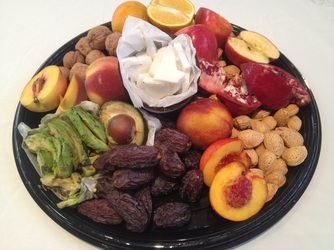| This Shabbat brings together two different, and sometimes contradictory, ways of looking at our food. The first lesson, from this week's Torah portion (Beshalach), reminds us to release ourselves from the impulse to fill ourselves with food beyond what we need. The second lesson, from the holiday of Tu BiShvat, reminds us to reflect on the potential for sanctity in every morsel we consume. Both are lessons in experiencing satisfaction and happiness. |
God responded to the ingratitude of the Israelites by producing a miraculous food for them. The manna fell from the sky with the morning dew and was "like coriander seed, white, and it tasted like wafers in honey" (Exodus 16:31). Yum.
But the Torah says explicitly that the manna was not just a gift from God, it also was a test "to see whether they will follow My instructions or not" (Exodus 16:4). The Israelites had to go out to gather the manna six days a week. On Fridays, double the normal amount of manna was gathered so that the Israelites would have enough for Shabbat. On Shabbat, no manna fell.
The Israelites were instructed not to gather more manna than they needed. Miraculously, no matter how much manna each person collected, when they measured it, each person had exactly the right amount he or she needed to eat that day. Moses told them not to hoard manna. When some people tried to save manna beyond the day it was gathered, it became infested with maggots.
So, what was the test? Manna was an object lesson in accepting sufficiency. It taught the Israelites to quiet the parts of their minds that wanted to grasp to acquire as much as they could get, even beyond what they needed. Manna reminds us to let go of that hungry, insatiable part of us that thinks we can never have enough. It reminds us to appreciate what we have and to recognize when we are satisfied.
That is not just an important lesson about food; it is a lesson about life. There are all kinds of things that we use to harm ourselves by stuffing ourselves beyond the point of satiety. Whether it is wealth, power, television, alcohol, sex or writing blog posts (!), we need to learn the point at which we can say, "enough." We need to learn that if you can never reach a point of satisfaction, you can never be happy.
The second lesson comes from the minor holiday of Tu BiShvat that falls on this Shabbat this year. Tu BiShvat often is called "Jewish Arbor Day," the day that marks the beginning of the year for trees and which was given mystical meaning by the Kabbalists of the 16th century.
To the Kabbalists, Tu BiShvat was regarded as a day of sacred unification. They created a seder for Tu BiShvat modeled on the seder for Pesach. Many of the ritual foods eaten at the seder are fruits and nuts that grow on trees, divided into three categories that represent the levels of spiritual existence. Eating these foods at the seder is regarded as a tikkun, an action that has the power to rejuvenate the cosmos. Just as the sap in the trees begins to flow in the land of Israel at this time of year, the Kabbalists saw Tu BiShvat as the time when we can renew the flow of divine energy--shefa—throughout creation.
In P'ri Etz Hadar, the anonymous Kabbalistic origin of the Tu BiShvat seder, a person recites a special prayer upon eating tree fruits on Tu BiShvat:
May it be Your will Adonai our God and God of our ancestors, that through the sacred power of our eating fruit, which we are now eating and blessing, while reflecting on the secret of their supernal roots upon which they depend, that shefa, favor, blessing, and bounty be bestowed upon them. May the angels appointed over them also be filled by the powerful shefa of their glory, may it return and cause them to grow a second time, from the beginning of the year and until its end, for bounty and blessing, for good life and peace…
Whether or not you accept the idea that a person can effect the cosmos by eating fruits with a particular intention, the idea behind the seder for Tu BiShvat can teach us a lot about our relationship with our food. It is also a lesson in the way we exist in the world.
Eating food is built into us. It is an inescapable reality of our physical existence. When we eat with intention—an awareness beyond satisfying our animalistic desires—we discover deep truths about ourselves. We can experience the pleasure of eating as a meditation on what it means to be alive in a world that has been given to us as the greatest possible gift we will ever receive. Eating becomes a sacred act in which our minds, bodies, spirit, and the spirit of the universe are united. We discover the Infinite in confronting the basic physical realities of being alive.
These two interpretations of our relationship with food may seem like a contradiction. On the one hand, manna teaches us to accept limitations. Manna is a symbol of how we are asked to restrict our appetites in order to learn to appreciate sufficiency. In contrast, Tu BiShvat is about an expansive view of our relationship with food. The seder focusses on how, by consuming the fruit of the tree with an elevated intention, we become part of a limitless, unrestricted experience in which we take part in the repair of the cosmos.
In truth, the two lessons are one. We build our soaring spiritual lives on a foundation of discipline. By accepting limitations on ourselves—what we eat, how much we consume, where we find our nourishment—we free ourselves to discover deep, revealing, ecstatic truths. By elevating ourselves above slavery to our base desires, we awaken deep appreciation of, and deep connection to, the world of which we are a part.
We eat with responsibility, with awareness, and with joy.
Other Posts on This Topic:
Tu BiShvat: The Tree and the Renewal of Creation
Sukkot: Reconnecting to Our Food
Sh'mini: Eat. Pray. Kashrut.



 RSS Feed
RSS Feed
